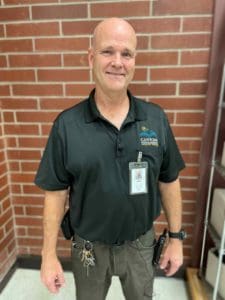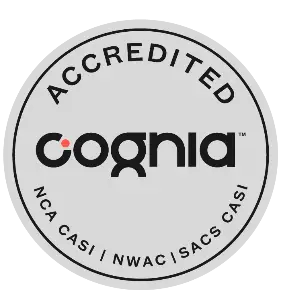As students around Canyons District join the country in reflecting over 9/11 this weekend, one CSD employee would rather think about almost anything else — and understandably so.
Lone Peak Elementary assistant facilities manager Mark Ward is reluctant to speak or think about what happened on Sept. 11, 2001 and his harrowing involvement in the ensuing rescue-and-recovery efforts. With that in mind, Canyons School District is appreciative of Mark’s willingness to share some memories of what he went through and witnessed as a New York City firefighter at the time.
Mark’s personal experience at Ground Zero after the terrorist attacks 21 years ago offers a solemn testament to the heartbreaking loss of 2,977 lives taken from us on Sept. 11, 2001 and to the inestimable, gallant and heroic sacrifices made in the aftermath of that day’s tragic events.
——

Mark Ward has worked for Canyons District for about two and a half years, but before he and his wife followed their daughter to Utah from New York for a change of scenery and lifestyle, the native New Yorker spent the vast majority of his life in the Empire State. In what seems like a different lifetime, Mark was an FDNY firefighter from 1986 through the beginning of 2007.
That 21-year firefighting career in the South Bronx firehouse — Engine 83, Ladder 29 — included some remarkable experiences. He smiles remembering when he and colleagues helped deliver a couple of babies. “It’s pretty cool,” he says. He’s grateful to have assisted in “a pre-hospital save,” which is when firefighters perform first-aid procedures like CPR to revive someone’s life. And there were the times he worked on “a good fire,” which is what they called it when they put out a fire and nobody got hurt.
As a bonus, Mark picked up some serious cooking skills from when it was his group’s turn to feed the firehouse. (Firefighters assigned to the engine and truck swap turns cooking and taking the watch.)
“It was a fun job,” Mark says. “The guys were good. It was more like being with your family than being at work.”
Mark was at his home in Orange County, New York — about 50 minutes away from Manhattan — when terrorists attacked the country with hijacked airplanes on the morning of Sept. 11, 2001. He received a call to report in shortly after a second airplane was flown into one of the Twin Towers at the World Trade Center.
While millions fled the city to seek shelter and safety elsewhere, Mark was among thousands of first responders who rushed toward the mayhem to help.
“By the time we got down there … it was like a movie set. It didn’t look real,” Mark recalls. “There was this much (hands outstretched about a foot) dust on the ground. It was like it was snowing there was so much dust in the air.”
As the rubble from toppled buildings and the plume of toxic dust settled around New York City, Mark joined the massive search-and-rescue, recovery, and clean-up efforts in lower Manhattan. He was friends with quite a few people who died that day, including fellow firefighters, New York Police Department officers, and civilians.
“We lost (343) firefighters. I lost 30 friends,” he recalls with painful emotion in his voice. “It wasn’t a good day.”
Though he spent hours and hours digging and searching through debris, Mark doesn’t consider his actions heroic. It was his duty.
“Guys that got killed were heroes,” he softly says, referring to the 415 NYC emergency workers who died that day. “I was just working. You don’t really think about it. You just do your job, the training kicks in.”
Despite brutal conditions, the living heroes continued to dig and dig and dig, excavate and search for clues in an arduous and emotionally taxing identification process. “If you were down there, you were digging,” he says.
Some rays of light pierced through the overwhelming darkness of the tragedy.
“It was a lot of people. There were volunteers, the fire fighters, construction workers. It was a lot of people doing it,” Mark says. “You could see the support and stuff coming down to the city from everywhere, people wanting to volunteer … people bringing food, water, whatever. You definitely saw a lot of support.”
Mark and other first responders remained on site for days straight in the immediate aftermath. Eventually, a system was implemented that had emergency personnel work in 30-day shifts, with 12 hours on and 12 hours off each day. Search-and-rescue efforts lasted for a number of heartbreaking days. Harrowing recovery and ID attempts and clean-up tasks painstakingly continued for months.
“They were digging for a long time,” Mark recalls. “And since we’ve officially finished, I haven’t been back. I haven’t seen the rebuilding or anything like that. I don’t want to go back.”
Mark remained working as a firefighter in New York for another five years before retiring from the NYFD. It boosts his morale to keep in touch with old colleagues and friends from his firefighting days, but he is content with being 2,200 miles away. He might return to New York to visit relatives, but Mark never plans on revisiting Ground Zero. It’s hard enough to just think and talk about what happened there 21 years ago. Going back would be too painful.
“I try not to think about it that much because it’s upsetting,” Mark says. “Not that I don’t think about it, but I try not to dwell on it. Otherwise, it just brings me down.”
While there aren’t a lot of similarities between being a firefighter and a custodian, Mark considers the people he gets to work with to be the best part about both jobs.
“I like working with the kids.”





